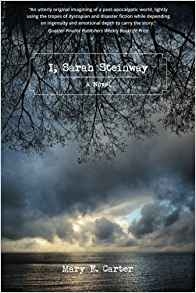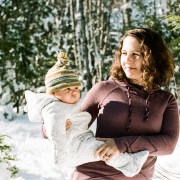The specter of a flood-swept future is all too easy to envision. In the past two years alone, catastrophic floods have inundated parts of Maryland, Texas, and Louisiana.
It scarcely seems a stretch, then, to imagine a flood along the California coast of a magnitude that would drive Bay Area residents to find sanctuary in the trees. Mary E. Carter’s new novel, I, Sarah Steinway (Tovah Miriam Gershom), describes just such a scenario.
As high tides lead to intermittent flooding and looting at Costco and sea levels rise, 75-year-old Sarah Steinway predicts that a flood of Biblical proportions is nigh. When her doom-saying turns out to be correct, she declares herself a prophet and rabbi. And to temper her rage at a God she isn’t sure she believes in, Sarah begins reading and interpreting Torah.
“Being human I start to think about God and to sulk. How could He, She, or It do this to me? To innocent little me? Sarah Steinway? I ask you. So out of curiosity I turn to the old books. Scripture. Or Torah. Or whatever you call it. I mean, I have no earthly idea what’s inside those pages, me secular and all. What’s this God business anyway?”
To prepare for the inevitable, rather than heading to higher ground, she has Epps, her talented and handsome neighbor build her a fortified tree house in which she will live for the next five years. She grows beans and grapes in pots, eats fish and kudzu harvested from the water, and types her memoir on a manual typewriter.
Much of the novel describes Sarah’s observations from her perch, above the raging waters polluted with waste, human and plastic.
“Experimentally, I discovered that when the tide was high, I could dip a bucket into one of the schools of all the fish in the sea, and voila, it was so easy.… I organized my days around: survival, staying sane, sheer terror, utter despair, keeping well, sitting, sleeping, weeping, screaming – and now a new task to add to my schedule – watching with my binoculars the very slow progress, in my direction, of the distant kudzu vines.”
Sarah’s solitary meditations take up two thirds of the book. It’s an enjoyable read in the vein of Robinson Crusoe or My Side of the Mountain – solo survival with plausible parameters. Carter’s language can feel a bit stilted, though it may be a deliberate way of conveying Steinway’s decline into a kind of madness.
I, Sarah Steinway drifts towards something like a climax when she plays hostess to a cat, a dog, and two rabbis. Steinway interprets their appearance as a sign of divine intervention, though somewhat skeptically.
“…I am thrust back upon my mother’s training. Reminded of words so ancient as to be rendered either completely forgotten or eminently holy: Remember you were slaves in Egypt and welcome the stranger in your midst. … And here I am, hostess to these surviving souls, even though I myself have been left here alone to die by an unknowable God who enacts whatever He, She or It has in a His, Her or Its greater plan.”
Sarah, the pets, and Rabbis Mendel and Wurlitzer briefly enjoy communal living, complete with morning yoga and Torah discussions, until the plot and the tides propel things toward their conclusion. Sarah is an appealing character, and the more insights we gain about her motivations, the more we root for her. In contrast, the rabbis appear and vanish without ever becoming three-dimensional characters.
Mary E. Carter’s depiction of a woman taking tentative steps toward faith parallels her own journey towards conversion, which she wrote about in her memoir A Non-Swimmer Considers Her Mikvah: On Becoming Jewish After Fifty. The ubiquitous water that surrounds Sarah Steinway’s tree house ties her to Noah and the ark, to the rescue of baby Moses from the Nile – to the biblical roots of Judaism itself.
At its essence, this novel is a modern take on the Book of Job and its inherent theological conundrum: How can a merciful God allow the innocent to suffer? Carter deserves praise for tackling this endlessly baffling question.
Courtney Naliboff lives, writes, teaches, and parents on North Haven, an island off the coast of Maine. She is a columnist for Working Waterfront, and writes about rural Jewish parenting for Kveller.com.
View all posts by Courtney Naliboff
Give to the URJ
The Union for Reform Judaism leads the largest and most diverse Jewish movement in North America.


